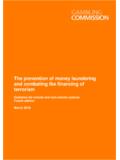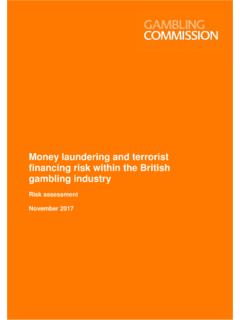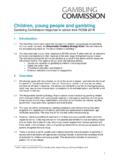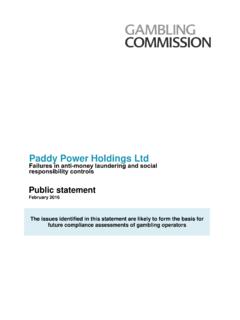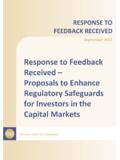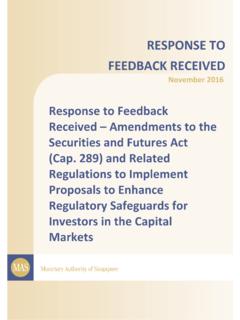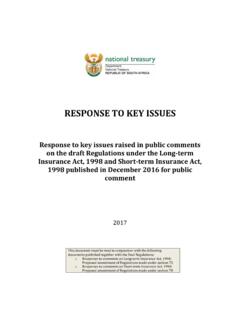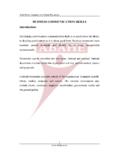Transcription of Remote gambling and software technical standards
1 Remote gambling and software technical standards Consultation response June 2017 2 Contents 1 Introduction 3 2 General changes to format and layout 4 3 High frequency lotteries 4 4 gambling and account history and net deposits 5 5 Restricted display device 9 6 Display of Commission licensed status 12 7 Display of transactions 14 8 Game identifier 16 9 Live RTP monitoring 19 10 Play-for-fun games 21 11 New and emerging game designs 22 12 Peer-to-peer poker 25 13 Use of third party software 28 14 Financial limits 31 15 Reality checks 33 16 Live dealer studios 36 17 Linked progressive jackpots 37 18 Virtual sports odds 40 19 Information security standards 44 20 Other changes (in-running vs in-play betting) 47 21 Regulatory impact 47 22 Implementation timetable 50 23 List of respondents 51 Annex A 3 1 Introduction In October 2016, the gambling Commission (the Commission) published its consultation on the Remote gambling and software technical standards (RTS).
2 The RTS has, prior to this consultation, remained relatively unchanged since it was first published in 20071. The consultation provided an opportunity to ensure the RTS reflects and accommodates changes to the Remote gambling environment. The last few years have seen a significant growth in online gambling , innovation and the increased availability and take-up of new channels through which consumers can take part in gambling (eg mobile devices). In parallel to these developments, the implementation of the gambling (Licensing and Advertising) Act in 2014 expanded our regulatory We consulted on a number of proposals which sought to: Ensure gambling is conducted in a fair and open way Ensure consumers are provided with clear guidance on gambling products and responsible gambling tools Deliver an effective and proportionate legal framework Ensure the RTS is structured in a manner that is clear and accessible Reflect the changes to the recently updated testing strategy, such as the live RTP monitoring requirement.
3 The consultation closed on 17 January 2017, and we would like to thank all the organisations and individuals who responded or took part in stakeholder meetings. There were a total of 36 responses to the consultation which included licensees, professional services firms, software suppliers and test houses. The breakdown of respondents by category can be seen in section 23 of this document. This document sets out the Commission s final position taking into consideration responses received. It does not purport to describe all of the responses in detail but sets out the key issues identified during the consultation period and explains the changes the Commission has made as a result. We have highlighted in italics actual statements that were used in the submission responses.
4 The updated RTS (with the changes outlined in this document) is due to be published in June 2017. A number of proposals will come into effect on 1 October 2017, three months from the date at which the updated RTS has been published. Those proposals that require further development work will come into force 1 April 2018 (nine months from the RTS publication date). We have also updated the RTS to reflect changes in the updated testing strategy and to formalise guidance previously provided on the Commission s blog. These updates and other interim measures (eg display of Commission licensed status) will come into force with immediate effect. A summary of implementation dates for each proposal is provided in section 22. 1 Changes have been made to the security elements in order to update them from ISO 27001:2005 to the 2013 standard.
5 More recently changes were made to auto-play (RTS 8) and a new reality check (RTS 13) requirement was added as a result of the Strengthening social responsibility consultation that concluded in October 2014. 2 From 1 November 2014, gambling in Britain is regulated at the point of consumption rather than the point of supply. This means that Remote gambling operators who deliver their services to consumers located in Great Britain now require a licence from the Commission regardless of where their equipment is located. 4 2 General changes to format and layout Consultation proposals The previous RTS included information provision annexes (IPAs), which were less technical in nature and more concerned with how information should be displayed.
6 In most cases an IPA was directly related to one of the technical requirements. For example, RTS 1 - Customer account information outlined the requirements for the display of customer account balances, and IPA 1 goes further and outlines how historical account and gambling transaction should be displayed. To simplify and reduce duplication, we proposed to merge the IPAs with their corresponding technical standards . New standards were created for those IPAs that did not fit easily into the technical standards (eg IPA 3 is now listed as RTS 15). We intend to update the supporting testing strategy and other relevant guidance to incorporate any new standards and changes made to the numbering of existing requirements as a result of this consultation.
7 Respondents views All responses to this proposal were positive and the comments we received stated that merging the sections would make it easier to follow, provide clarity and reduce duplication. 3 High frequency lotteries During the consultation we were asked to clarify whether the updated RTS would apply to holders of an ancillary lotteries We have updated the RTS to reflect that, in accordance with Licence condition ancillary lottery licences are exempt from the technical standards and testing strategy requirements. The technical standards adopt a risk based approach to lotteries exempting from certain requirements those products where the customer s spend is often controlled through subscriptions (eg RTS 12) and highlighting requirements that apply to instant lotteries.
8 We have noted the emergence of high frequency lottery products that, like instant lotteries, enable consumers to participate in multiple draws in a relatively short space of time. 3 The ancillary Remote licence is only suitable for holders of a non- Remote society lottery operating licence who want to accept payments for participation in a lottery by Remote means, up to a maximum of proceeds of 250,000 per annum. If you do not hold a non- Remote society lottery operating licence and wish to take payments by Remote means, you must hold a full Remote licence. If you currently hold a non- Remote and ancillary Remote society lottery licence, but your proceeds are expected to exceed 250,000 per annum, a full Remote society lottery operating licence will be required.
9 Consultation question 1. Do you agree with our proposal to merge IPAs with the technical standards ? The Commission s position general changes to format and layout We have merged the RTS and IPA requirements where applicable and introduced new standards for IPAs that do not directly correlate to an existing requirement. RTS summary table We have also added a new table to the RTS which details, for ease of reference, all technical standards and their applicability to different gambling products. The table (Annex A) provides a high-level overview and should be considered in conjunction with the relevant sections of the RTS. 5 These products present similar risks to instant lotteries and will need to adhere to the relevant technical standards .
10 For clarity, we have updated the definition of an instant win lottery and included a definition of high frequency lottery, as follows: High Frequency Lottery: A lottery in which any draw takes place less than one hour after a draw in a previous lottery promoted on behalf of the same non-commercial society or local authority or as part of the same multiple lottery scheme. Instant Lottery: A lottery in which every draw takes place either before, or at the point of, purchase of tickets by participants in the lottery. 4 gambling and account history and net deposits New requirements (RTS 1) Consultation proposals The RTS requires licensees to have provisions that enable consumers to review previous gambling and account The implementation guidance specified the information that should be provided to consumers, but did not prescribe that consumers be able to access historic transactions over a specific period of time (eg all transactions over the previous 12 months).

